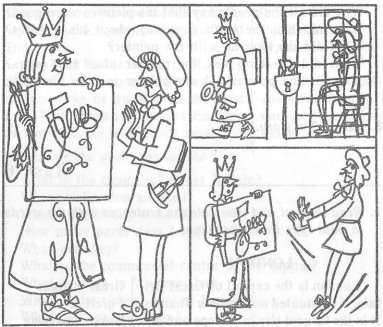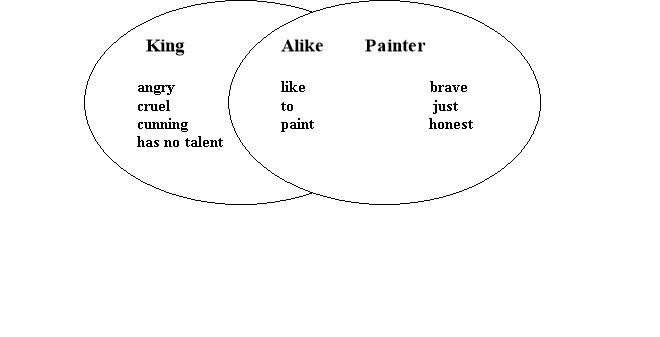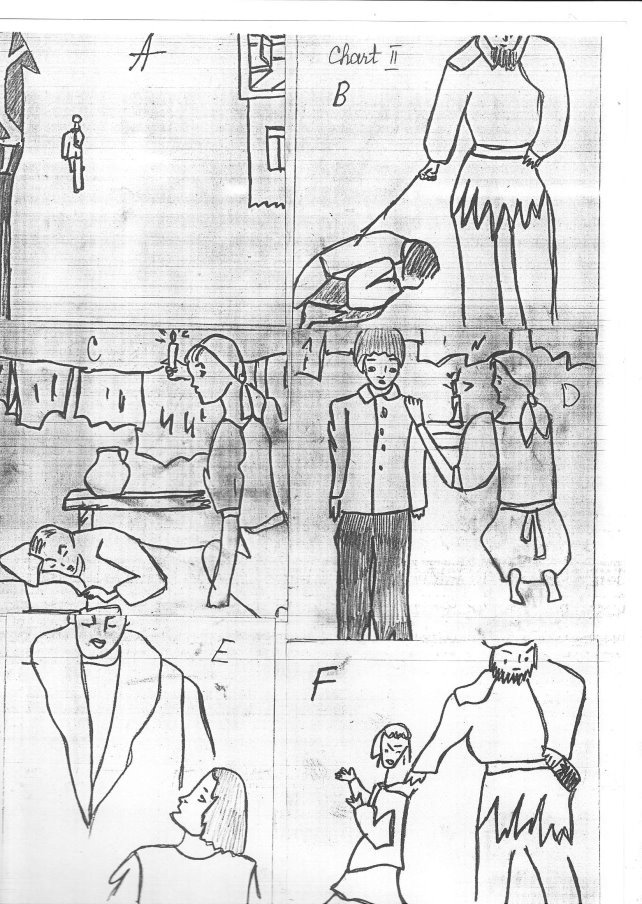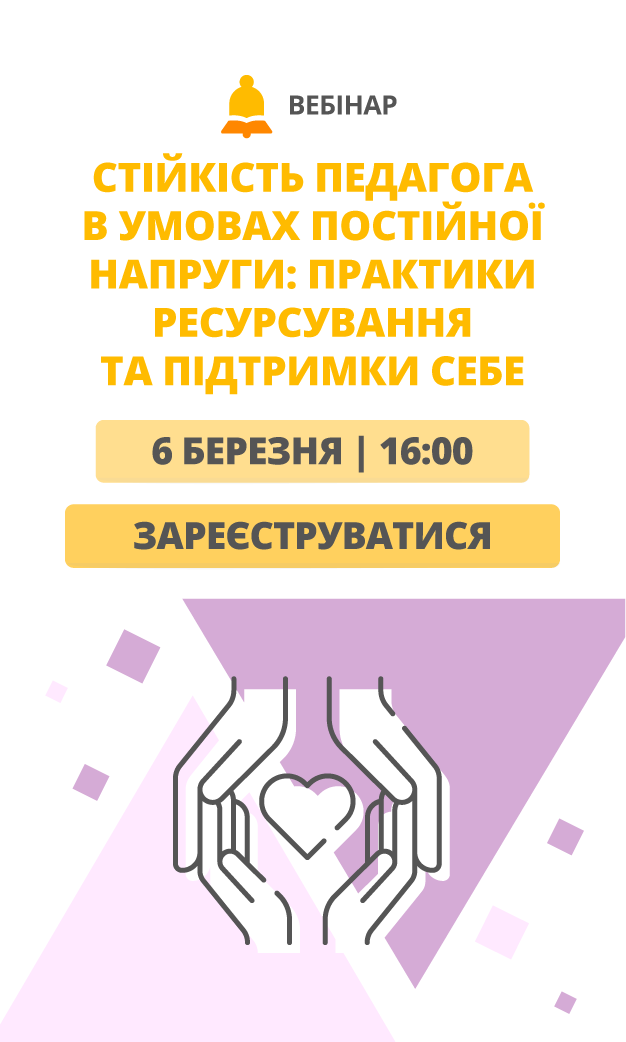Урок домашнього читання. Конспект уроку домашнього читання з анг.мови в 4 класі.
Конспект уроку домашнього читання з анг.мови в 4 класі з використанням технології розвитку критичного мислення.(Venn Diagram,Cause or Effect,
MOOD / FEELING (emotions),Round- Table Talk)
Home-Reading Lesson
Level – Elementary 4 Form
THE KING & THE PAINTER

THE KING AND THE PAINTER
Once there was a king who liked to paint pictures, but his pictures were bad and nobody liked them. The people to whom the king showed his pictures were afraid of him, and they said that the pictures were good.
One day the king showed the pictures to a great painter who lived in that country and said, "Tell me, what do you think of my pictures? Am I a good painter or not?"
The painter looked at the king's pictures and said, "My king, the pictures are bad and you will never be a good painter."
The king was very angry and sent the painter to prison.
After two years the king wanted to see the painter again. When the painter came, the king gave him a good dinner and said, "Now you are a free man and I am your friend. Look at my new pictures and say if you like them now."
The painter did not answer. He turned to the soldier who was in the room and said, "Take me back to prison."
Home-Reading Lesson
Level – Elementary
THE KING & THE PAINTER
Objectives:
Practical: to improve students’ reading, speaking and listening comprehension skills.
Educational: to enlarge students’ knowledge of how to become successful.
Developing: to develop students’ critical and logical thinking skills:
to find out the main ideas and supporting details, causes and effects,
to see how the events keep the story go,
to choose facts and ideas,
to examine and interpret the text,
to recognize the mood.
Up – bringing: to encourage pupils’ self – confidence, optimism;
to convince them that success does not happen by accident,
it can be achieved by hard work.
Facilities: individual cards, computers.
PROCEDURE:
I. Greetings. Warming-up.
T: Are the best pupils in the world learning here?
Good morning, hard-working, clever, smart, bright and well-bread pupils.
Are you striving for success? Where are you now? How are you fleeling now? I am on the top of the world, because I have the best pupils in the world. And you? Copy down any of these words into your flag-cards.
On the top of the world



Splendid
Very well
Fine
Bad
So, what is the topic of our lesson? What is a success for you?
SUCCESS
T: For me personally, success is to be healthy and for you?
P1. For me, success is to be wealthy.
P2. As for me, success is to become a pop- star.
P3. In my opinion, success is to have my own office.
T: Do you know what? Once Tomas Edison said that success is 1% of talent and 99% of perspiration. So, if you work hard during our English lesson, you will be able to talk, to write, to choose facts and ideas, to interact with the pupils, you will understand what you read, you'll become a critical thinker, you will ask and answer the questions, you will not play and so on. Predict on what level you will be at the end the lesson.
P1: I personally think, I’ll be splendid, because I’ll work hard during our lesson.
P2: I believe, I’ll be splendid, because I’ll read, listen, talk, write and translate.
P3: …………………………………………………………………….
P4: ………………………………………………………………………
II
Jazz Chant:
T: Respond to me, please.
I am successful. And you? I usually say “Yes” to knowledge, because knowledge is power. And you? What do you usually say?
P1: I say “No” to drugs.
P2: I speak with respect.
P3: I speak the truth.
P4: My word is my bond.
P5: Nothing is impossible.
P6: Never give up.
P7: I control my destiny.
P8: Can you help me when I need help?
P9: I will be respectful.
T: I usually Carry a lot of materials in my bags. And you? What do you usually carry?
P1: I carry my agenda at all times.
P2: I carry my materials.
P3: I carry notebooks.
P4: I carry pens.
P5: I carry textbooks.
P6: I carry paper.
P7: I carry a plan for the future.
P8: I carry a watch to be on time.
T: I usually Walk forward. I always run forward success. And you? How do you walk?
P1: I walk with pride.
P2: I walk with confidence.
P3: I walk with head up.
P4: I walk with a smile because my future is bright.
P5: I walk with dignity.
T: I usually Think “How can I be the best, always the best. And you? What do you think?
P1: I have the future.
P2: How can I do better?
P3: I must be positive.
P4: I must be on time.
T: Just do it!!! Work hard and you’ll be a Success. The problem is with whom?
III.
T: Find the partner:
Success does not happen by accident. It can be achieved by hard work. And I am sure, you’ll have it. Stand up, move around and find the partner you are striving for success with. Read, analyze and give Ukrainian equivalents:
P1.Through hardship……………. a. wise or learned.
P2.Ninety per cent of inspiration is…..... b. power.
P3.Business………… c. what can be done today.
P4.Faint heart never…. d. to the stars.
P5.Never put off till tomorrow……. e. before pleasure.
P6. No man is born……….. f. won fair lady.
P7.Knowledge is……… g. perspiration.
Keys: 1. d 2. g 3. e 4. f 5. с 6. a 7. b
IV.
T: I am sure you remember the title of the story you read yesterday.
P1: As far as I remember, the story goes under the title “The King & the Painter”.
It speaks for itself.
T: Is the language of the story easy or difficult for understanding?
P1. For me, it’s easy. P2: And for me it’s difficult.
T: When do the events take place? In the present, past or future? What tense is mostly used in the story?
T: Unite in twos and classify all the words into categories.
Take the cards and choose the words. It’s very important and you can do it. It’s not very difficult. Don’t be afraid of making mistakes. Exchange your cards.
V.
Structure
T: How many paragraphs have we got in the story? Skim the text once more and
find the paragraph that each of the following titles describes (write a number).There is one extra title that you don’t need to use.
- A Good Dinner
- An Angry King
- A Good or A Bad Painter?
- The Best Friends
- The King’s Hobby
- Bad Pictures
- Back To Prison
Keys: 5, 4, 2, 0, 1, 3, 6
Exchange your cards. Count only positive results of your friends’ hard work.
Who has got 6 positive circles?
VI.
Unite into two kingdoms. Name them and choose your own kings or queens.
The citizens of the Computer land will do the computer test:
1.This story is about…
a. the king.
b. the king and painter.
c. the painter.
2. The people…
a. liked the pictures.
b. liked the king.
c. were afraid of the king.
3. The king…
a. did not show his pictures.
b. showed the pictures to a great painter.
c. showed his castle.
4. The king…
a. will not be a good painter.
b. was a great painter.
c. is a very good painter.
5. The king…
a. did not send the painter to prison.
b. sent the painter to prison.
c. sent the painter to another country.
6. The painter wanted…
a. to have a good dinner.
b. to look at the pictures.
c. to take him back to prison.
VII.
The citizens of the Wonderland will find out what happened and why it happened in their kingdom.
Cause & Effect
When you ask: “Why did it happen?”- it is the Cause.
”What happened?”- it is the Effect.
Read the sentences and decide if the part of the sentence is the cause or the effect:
1. Nobody liked the king’s pictures, because they were bad.
2. The people said that the pictures were good ,because they were afraid of the king.
3. When the painter did not like the king’s pictures, the king became very angry.
4. The painter wanted to take him back to prison, because the king’s new pictures were bad.
VIII.
COMPARE AND CONTRAST
Venn Diagram
додаток

 Round- Table Talk
Round- Table Talk
T: 1. What were the main characters? What were their hobbies? Were they different or alike?
2. Why did all the people say that his pictures were good?
3. Who told the king the truth about his pictures?
4. What happened then? Why? Did the king send the painter to prison?
5. What did the king ask the painter after two years?
6. Why did the painter ask the soldier to take him back to prison?
7. Were the king and the painter successful in their lives? Who was talented and who was successful?
IX.
Mood
T: What feelings do you get from reading the story? Is it happy or sad?
X.
Hometask: Think about the happy end of the story. Draw the character map. Write a short story, covering the following ideas:
Will the king and the painter become friends?
Will the king be successful in painting?
Will the painter help him to learn how to paint very well?
XI.
Evaluation:
T: Have you achieved your own success at our lesson? Where are you now? Copy
down any of these words into your flag-cards.
On the top of the world

Splendid
Very well
Fine
Bad
T: You were good at doing test.
You’ve made a good progress in analyzing the text.
You were quick at answering the questions.
You were witty at finding details, facts, ideas.
I am sure, you’ll be successful. Remember, the future belongs to those who believe in the beauty of their dreams. Let miracles happen tonight. Happy St. Nicholas night!
Making Analogies
Listen, read and find the facts and ideas. Write the letter (I) or (F). For example:
You are the pupils of Baranivka School N« 2. It's the Fact (F) You are the best pupils of our school. It's the Idea. (I)
- The king liked to paint pictures.
- His pictures were bad.
- The people to whom the king showed his pictures were afraid of him.
- They said that the pictures were good.
- Once the king showed his pictures to a great painter.
- The king will never be a good painter.
- He sent the painter to prison.
- The painter wanted to have a good dinner.
- The soldier did not take the painter to prison.
- Soon the king and the painter became the best friends in the world.
Cause & Effect
When you ask: "Why did it happen"- it is the Cause. "What happened?"- it is the Effect.
Read the sentences and decide if the part of the sentence is the cause or the effect:
- Nobody liked the king's pictures, because they were bad.
- The people saffl that the pictures were good ^because they were afraid of the king.
- When the painter did not like the king's pictures, the king became very angry.
- The painter wanted to take him back to prison, because the king's new pictures were bad.
Through hardship…
to the stars.
Ninety per cent of inspiration is …
perspiration.
Business before…
pleasure.
Faint heart never won…
fair lady.
Never put off till tomorrow…
what can be done today.
No man is born…
wise or learned.
Knowledge is…
power.
Nobody liked the king’s pictures because…
they were bad.
The people said that the pictures were good because…
they were afraid of the king.
When the painter did not like the king’s pictures, …
the king became very angry.
The painter wanted to take him back to prison, …
because the king’s new pictures were bad.
"The Prince and the Pauper"
|
1 |
|
|
|
|
|
|
|
||||||
|
2 |
|
|
|
|
|
|
|
||||||
|
3 |
|
|
|
|
|
|
|
|
|
|
|||
|
4 |
|
|
|
|
|
||||||||
|
5 |
|
|
|
|
|
|
|
|
|
||||
|
6 |
|
|
|
|
|
|
|
|
|
||||
|
7 |
|
|
|
|
|
|
|
|
|||||
|
8 |
|
|
|
|
|
|
|
||||||
|
|
|
|
|
|
|
||||||||
|
|
|
|
|
|
|
||||||||
|
11 |
|
|
|
|
|
|
|
|
|||||
- river, London stands on;
- test;
- the synonym to the word " to fight ";
- to ask money ( ftod, clothes ) in the streets;
- a person carrying a message;
- lashing;
- to protect;
- the feeling that wakes people want to quarrel or fight;
- mentally ill;
- hard stroke given with the hand or stick;
- the country in Great Britain.



про публікацію авторської розробки
Додати розробку
